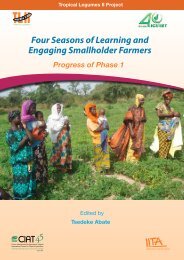Four Seasons of Learning and Engaging Smallholder Farmers - icrisat
Four Seasons of Learning and Engaging Smallholder Farmers - icrisat
Four Seasons of Learning and Engaging Smallholder Farmers - icrisat
Create successful ePaper yourself
Turn your PDF publications into a flip-book with our unique Google optimized e-Paper software.
Table 10-4: Pre-release or released varieties used in PVS trials (2008-10 crop seasons)<br />
Country<br />
Variety name<br />
Medium duration Long duration Check<br />
Tanzania ICEAP 00554, ICEAP 00557 ICEAP 00040, ICEAP 00053, ICEAP<br />
00576-1, ICEAP 00932, ICEAP 00933,<br />
ICEAP 00936<br />
Malawi ICEAP 01514/15, ICEAP 00557,<br />
ICEAP 01480/2, ICEAP 01162/21,<br />
ICEAP 01167/11<br />
Table 10-5: Varieties preferred by farmers<br />
ICEAP 00040, ICEAP 00020, ICEAP<br />
00932, ICEAP 00576-1<br />
Local<br />
variety<br />
Mthwajuni<br />
Country<br />
Variety<br />
Medium duration<br />
Long duration<br />
Tanzania ICEAP 00554, ICEAP 00557 ICEAP 00040 (Mali), ICEAP 00053, ICEAP<br />
00932, ICEAP 00936<br />
Malawi ICEAP 01514/15, ICEAP 00557, ICEAP<br />
01167/11<br />
ICEAP 00932, ICEAP 00576-1<br />
Seed Production <strong>and</strong> Delivery Systems<br />
In Eastern <strong>and</strong> Southern Africa, lack <strong>of</strong> awareness <strong>and</strong> limited or no access to quality seed attributed by<br />
consistent failure <strong>of</strong> public sector in supplying good quality breeder/foundation seed in desired quantities,<br />
private sector has shown little interest in investing pigeonpea seed production <strong>and</strong> marketing, most<br />
<strong>of</strong>ten seed production areas are far away from its area <strong>of</strong> utilization because <strong>of</strong> isolation requirements<br />
<strong>and</strong> availability <strong>of</strong> infrastructure for storage <strong>and</strong> processing leading to high transaction seed costs.<br />
Through this project selective investments have been made to overcome these constraints in breeder<br />
<strong>and</strong> foundation seed production, <strong>and</strong> seed sale proceeds used to create seed revolving funds especially<br />
in Malawi (ICRISAT model) for future use.<br />
Private seed companies <strong>and</strong> NGOs took the lead in acquiring Foundation Seed for further seed increase<br />
<strong>and</strong> dissemination. Most <strong>of</strong> the farmers rely on self-saved seed <strong>and</strong> access to seed <strong>of</strong> improved varieties<br />
either through informal networks. The baseline survey also points out existence <strong>of</strong> two seed supply<br />
systems, namely informal, which are usually non-market based <strong>and</strong> the quasi-formal, mainly marketbased<br />
seed supply systems. The informal seed supply sources included own saved seed; gifts from<br />
family <strong>and</strong> friends; farmer-to-farmer seed exchanges <strong>and</strong> others. The importance <strong>of</strong> quasi-formal<br />
seems to increase with formal release <strong>of</strong> new farmer- <strong>and</strong> market-preferred varieties, which helps in<br />
augmentation <strong>of</strong> seed dem<strong>and</strong> <strong>and</strong> seed markets for superior varieties.<br />
During the past four years (2007-10) a total <strong>of</strong> 21.18 MT Breeder Seed <strong>and</strong> 440.2 MT Foundation <strong>and</strong><br />
Certified seed <strong>of</strong> farmer-preferred improved pigeonpea varieties was produced at research stations <strong>and</strong><br />
farmers’ fields (Tables 10-6 & 10-7). In Tanzania, farmers <strong>and</strong> farmer groups were engaged in seed<br />
production. Twenty one MT <strong>of</strong> quality seed <strong>of</strong> four varieties (12.2 MT Mali, 7.6 MT ICEAP 00053, 0.4 MT<br />
ICEAP 00932 <strong>and</strong> 0.8 MT ICEAP 00554) was distributed to farmers during 2007-09; this covered 2653<br />
ha in farmers’ fields in seed production <strong>and</strong> subsequent seed sharing among the farming community<br />
in the project areas. Similarly, 1.7 MT <strong>of</strong> quality seed <strong>of</strong> four varieties was distributed to 15 farmers’<br />
groups <strong>and</strong> facilitated the production <strong>of</strong> 11.0 MT <strong>of</strong> quality seed (Tables 9 & 10). RECODA (Research,<br />
Community <strong>and</strong> Organizational Development Associates) in Endabash Ward in Karatu District, World<br />
Vision through Gorowa ADP (Area Development Program) in Duru <strong>and</strong> Riroda wards in Babati District<br />
<strong>and</strong> CRS (Catholic Relief Services) through Mbulu Catholic Diocese supported smallholder farmers in<br />
North <strong>and</strong> Central Karatu by buying pigeon pea seed from farmers <strong>and</strong> other sources <strong>and</strong> distributing<br />
to smallholder farmers.<br />
Progress <strong>of</strong> Phase 1<br />
211

















